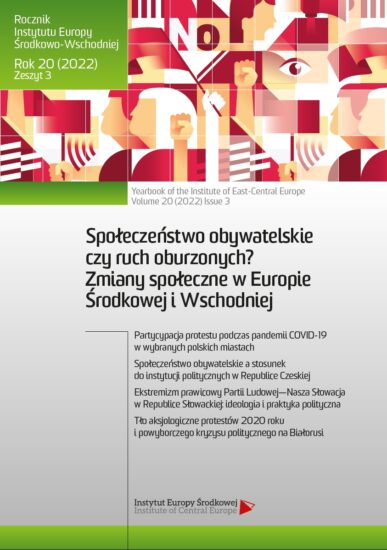“Women’s Strike”. Socio-cultural changes as a result of protests in Poland
ORCID: Grażyna Piechota: 0000-0002-0662-5074
Afiliacja: Krakowska Akademia im. A. Frycza-Modrzewskiego,
Kraków, Polska
Pages: 97-114
Edition: Lublin 2022
DOI: https://doi.org/10.36874/RIESW.2022.3.4
Citation method: G. Piechota, „Strajk Kobiet”. Zmiany społeczno-kulturowe jako efekt protestów w Polsce, „Rocznik Instytutu Europy Środkowo-Wschodniej” 20(2022), z. 3, s. 97-114, DOI: https://doi.org/10.36874/RIESW.2022.3.4.
Abstract:
This paper is devoted to the analysis of the socio-political changes that occurred in Poland in 2016 as a result of the outbreak of the so-called black protests. The protests, which later became known as the All-Poland Women’s Strike, were activated several times in the following years, as a result of subsequent events related to the provisions regulating the right to abortion in Poland. The empirical findings contained in this text result from the analysis of statistical data (CBOS reports), dedicated to the research of political party electorates, which was carried out in 2015, 2017 and 2021. Moreover, the article presents own research conducted in the period from April to July 2021 using the method of analysis of the content published on social media by entities established after 2016. The results of the research confirm that the outbreak and the subsequent periodic activation of protests, supported by the activities of entities promoting the right to abortion, initiated two significant changes in Poland. The first is the clear polarization of political party electorates regarding the right to abortion, and the second is the intensification of the discourse on the very right to abortion, introducing new arguments regarding termination of pregnancy to the agenda (as well as other topics related to the situation of women and broadly understood sex education). Both of the indicated outcomes resulted in the phenomenon of abortion being visible in the public discourse, especially in social media. The following analysis is part of the trend of social research devoted to the importance of socio-political protests in democratic countries and the role of social media as an immanent tool used in the activity of new social movements.
Bibliography:
Castells M., Sieci oburzenia i nadziei. Ruchy społeczne w erze Internetu, Warszawa 2013.
Daphi P., “Imagine the streets”: The spatial dimension of protests’ transformative effects and its role in building movement identity, „Political Geography”, vol. 56, 2017, s. 34-43, DOI: https://doi.org/10.1016/j.polgeo.2016.10.003.
Disi Pavlic R., The Nearness of Youth: Spatial and Temporal Effects of Protests on Political Attitudes in Chile, „Latin American Politics and Society”, vol. 63, 2021, no. 1, s. 72-94, DOI: https://doi.org/10.1017/lap.2020.33.
Dombrowsky D., Constructing Identity on Social Networks. An Analysis of Competences of Communication Constructed on Facebook.com, „Central European Journal of Communication”, vol. 5, 2012, no. 8, s. 91-105.
Fergusson L., Molina C., Facebook Causes Protests (December 12, 2019), Documento CEDE No. 41, https://ssrn.com/abstract=3553514 or http://dx.doi.org/10.2139/ssrn.3553514.
Garland Ch., As Barriers Fall, Contingency Becomes Possibility, [w:] Protests as Events. Politics, Activism and Leisure, I.R. Lamond, K. Spracklen (eds.) London 2015, s. 121-135.
Gerbaudo P., Treré E., In Serch of the ‘We’ of Social Media Activism: Introduction to the Special Issue on Social Media and Protest Identities, „Information, Communication &Society”, vol. 18, 2015, no. 8, s. 865-871, DOI: https://doi.org/10.1080/1369118X.2015.1043319.
Jost J.T., Barberá P., Bonneau R., Langer M., Metzger M., Nagler N., Sterling J., Tucker J.A., How Social Media Facilitates Political Protest. Information, Motivation, and Social Networks, „Advances in Political Psychology”, vol. 39, 2018, no. S1, s. 85-118, DOI: https://doi.org/10.1111/pops.12478.
Klein G., Regan P., Dynamics of Political Protests, „International Organization”, vol. 72, 2018, no. 2, s. 485-521, DOI: https://doi.org/10.1017/S0020818318000061.
Komunikat z badań CBOS nr 124/2019 Elektoraty 2019 – charakterystyka poglądów, https://www.cbos.pl/SPISKOM.POL/2019/K_124_19.PDF.
Komunikat z badań CBOS nr 85/2015 Charakterystyka poglądów potencjalnych elektoratów partyjnych, https://www.cbos.pl/SPISKOM.POL/2015/K_085_15.PDF.
Komunikat z badań CBOS nr 91/2021 Elektoraty o istotnych kwestiach społeczno-politycznych, https://www.cbos.pl/SPISKOM.POL/2021/K_091_21.PDF.
Korolczuk E., Kowalska B., Ramme J., Snochowska-Gonzalez C., Mobilizacja kobiet w latach 2016-2018. Przyczyny, konteksty i perspektywy badawcze, [w:] Bunt kobiet. Czarne Protesty i Strajki Kobiet, E. Korolczuk, B. Kowalska, J. Ramme, C. Snochowska-Gonzalez (red.), Gdańsk 2018, s. 17-42.
Melucci A., A Challenging Codes: Collective Actions in the Information Age, Cambridge 1996.
Milan S., Social Movements and Their Technologies, NYC 2013.
Piechota G., Pomiędzy happeningiem a zmianą. Znaczenie komunikacji sieciowej w protestach społeczno-politycznych, Kraków 2018.
Piechota G., Rajczyk R., Lytvynenko V., Grydchyna V., The Type of Participation in Socio-Political Protests as a Function of Political Activation in the Era of Social Media, „Romanian Journal of Political Science”, vol. 20, 2020, no. 1, s. 188-213.
Rahbarqazi M., Morteza Noei Baghban S., Social Media, Political Discussion, and Political Protest: A Case Study of the 2018 Political Protests in Iran, „KOME − An International Journal of Pure Communication Inquiry”, vol. 7, 2019, no. 2, s. 89-103, DOI: 10.17646/KOME.75672.33.
Raport Forum Parlamentu Europejskiego ds. Praw Seksualnych i Reprodukcyjnych (EPF), 22.02.2022, https://www.epfweb.org/node/895.
Schultermandl S., Quick Media Feminisms and the Affective Worldmaking of Hashtag Activism, [w:] Affective Worldmaking. Narrative Counterpublics of Gender and Sexuality, S. Schultermandl, J. Aresin, S.S.P. Whybrew, D. Simicin (eds..), Bielefeld 2022, s. 185-200.
Suchomska J., Urzędowska D., Działania protestacyjne Strajku Kobiet w ujęciu teorii nowych ruchów społecznych, „Dyskurs & Dialog” 2021, nr 1, s. 9-22, DOI: 10.5281/zenodo.5040790.
Ustawa z 7 stycznia 1993 r. o planowaniu rodziny, ochronie płodu ludzkiego i warunkach dopuszczalności przerywania ciąży (Dz.U. z 1993 r. Nr 17, poz. 78, ze zm.), tekst jednolity: https://isap.sejm.gov.pl/isap.nsf/download.xsp/WDU19930170078/U/D19930078Lj.pdf.

PDF: Download